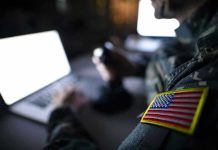
When elected officials rally military members to potentially defy orders, the legal and political ramifications are seismic.
Quick Take
- JD Vance condemns six Democratic lawmakers for their message to the military.
- Lawmakers argue their advice aligns with military law, but it’s highly controversial.
- Trump labels the lawmakers “traitors” and accuses them of sedition.
- The incident raises questions about civilian influence over military operations.
Political and Legal Boundaries in Military Conduct
Vice President JD Vance’s statement against Democratic lawmakers underscores a critical tension in military governance. The lawmakers, all with military backgrounds, released a video reminding service members of their right to refuse unlawful orders. While they argue this aligns with the Uniform Code of Military Justice, Vance claims such advice is illegal. The tension reflects deep-seated divisions over the military’s role in domestic affairs, especially as President Trump deploys National Guard units to Democratic cities.
President Trump’s response has added fuel to the fire, calling the lawmakers “traitors” on Truth Social and accusing them of sedition. This reaction highlights the stakes in the dispute, as the President’s authority over military matters is being challenged publicly. The lawmakers’ message, while potentially grounded in military law, is seen by Trump and Vance as a direct threat to military discipline and civilian oversight.
Historical Context and Military Law
The principle of civilian control over the military is deeply embedded in American governance. Article 92 of the Uniform Code of Military Justice allows service members to refuse unlawful orders, a lesson learned from historical events like the My Lai massacre. However, the public encouragement of such refusal by elected officials is unprecedented and legally complex. This controversy raises questions about the balance between legal obligations and military discipline.
Historically, the Posse Comitatus Act limits federal military use for domestic law enforcement, but National Guard deployments under certain conditions remain contentious. The current political climate amplifies these tensions, with increased scrutiny over military actions in politically charged environments. The involvement of high-ranking officials like Vance and Trump further escalates the conflict’s significance.
Stakeholder Dynamics and Influence
The key figures in this controversy include Vice President JD Vance, President Trump, and six Democratic lawmakers with military backgrounds. Vance and Trump aim to maintain presidential authority and military discipline, while the lawmakers emphasize constitutional principles and protection for military personnel. Military leadership and the Department of Defense must navigate these competing interests while upholding legal and ethical standards.
The power dynamics in this situation are complex. The President and Vice President possess significant authority over military deployments, but lawmakers with military experience carry credibility on these issues. The military must balance civilian control with legal compliance, a challenging task amid such political polarization.
Current Developments and Impact
The controversy is unfolding rapidly. As of November 24, 2025, Senator Elissa Slotkin clarified her lack of awareness of any unlawful orders from President Trump. The Department of Defense has yet to issue an official statement, leaving the legal status of the lawmakers’ advice ambiguous. Legal experts argue that the advice aligns with military law, but its public nature raises concerns about incitement.
This situation has significant short-term and long-term implications. Politically, it deepens partisan divides and raises questions about civilian-military relations. Militarily, it could affect morale and discipline, possibly prompting legal reforms. The economic and social impacts are also notable, with potential costs from increased military deployments and legal challenges. Ultimately, this episode highlights the fragility of civilian control and military law in times of political crisis.


















